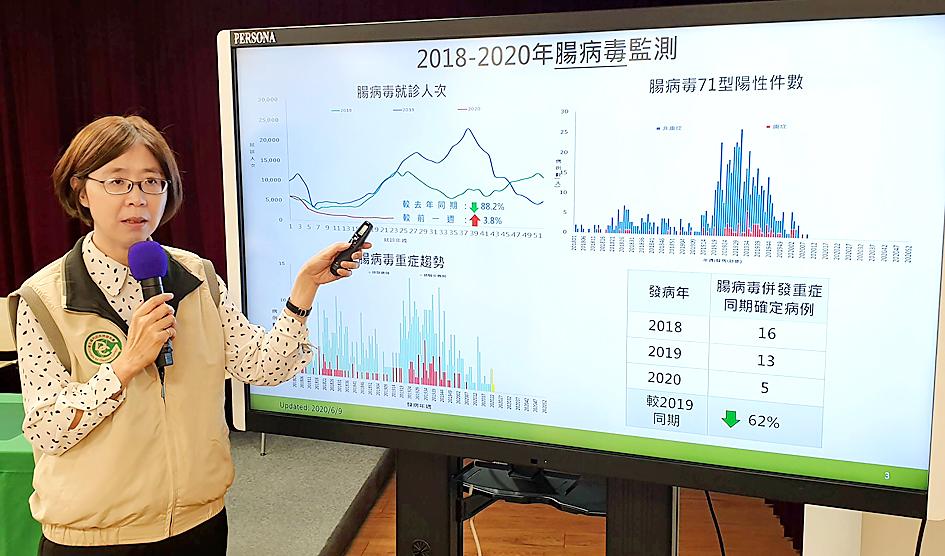The Centers for Disease Control (CDC) yesterday reported a significant drop in the case numbers of several types of infectious diseases in the first half of the year, attributing it in part to more people wearing masks and practicing personal protective measures to prevent COVID-19 infection.
The number of cases of flu-like illness and enterovirus infection reported from May 31 to Saturday last week fell 71.1 percent and 88.2 percent respectively from the same week last year, CDC Epidemic Intelligence Center Director Liu Ting-ping (劉定萍) said.
Taiwan regularly enters the peak season of enterovirus infections in May or June, with weekly reported cases exceeding the epidemic threshold (11,000 hospital visits in a week) in week 22 last year, while there were only 1,360 hospital visits last week (week 23), she said.

Photo: CNA
The number of cases of respiratory infectious diseases also declined significantly, with zero cases of measles or rubella reported so far this year, compared with 100 cases of measles and 17 cases of rubella in the same period last year, Liu said.
The case numbers of invasive pneumococcal disease and pertussis (whooping cough) also dropped 39 percent and 81 percent respectively, she added.
The sharp declines are likely attributable to more people wearing masks and washing their hands frequently, practicing social distancing and other personal protective measures to avoid contracting COVID-19, she said.

Photo: CNA
As for insect-borne diseases, Liu said there were no reports of Japanese encephalitis or domestic dengue fever so far this year, while the case numbers of scrub typhus and imported dengue fever dropped 43 percent and 67 percent respectively from the same period last year.
The reduced numbers might be due to fewer people traveling abroad or taking part in outdoor events, as most local dengue fever outbreaks in Taiwan begin with imported cases, she said.
However, there have been five cases of hantavirus hemorrhagic fever this year, CDC physician Lin Yung-ching (林詠青) said.
As the disease is transmitted to humans by inhaling the particles in the urine, saliva, or droppings of infected rats, mice and other rodents, people should wear a mask and rubber gloves when cleaning spaces and objects contaminated by rodents, and use bleach to disinfect the area, he said.
CDC Deputy Director-General Chuang Jen-hsiang (莊人祥) said that the five cases mark a 20-year high, adding that hantavirus hemorrhagic fever occurs sporadically in Taiwan, and people can avoid contracting it by practicing rodent control and keeping their environment disinfected.
Separately, Chuang said there were no new cases of COVID-19 infections yesterday, and only five infected patients remain isolated in hospitals.
The Central Epidemic Command Center (CECC) on Monday said it is planning to ease regulations to make it easier for business travelers to visit Taiwan after border restrictions are relaxed, such as having all foreign visitors take a polymerase chain reaction (PCR) test upon arrival.
The center is also considering allowing business travelers to enter Taiwan if they have obtained a negative PCR test result from their point of departure, giving them a shortened home quarantine period of five to 10 days, requiring them to take another self-paid PCR test before being released from quarantine and performing self-help management for 21 days from the date of arrival, said Chuang, who is also a CECC spokesman.
The CECC is considering first easing restrictions for business travelers from countries with a lower risk of COVID-19, such as New Zealand, Australia, Vietnam and Brunei, but more negotiations are needed, he said.

MAKING WAVES: China’s maritime militia could become a nontraditional threat in war, clogging up shipping lanes to prevent US or Japanese intervention, a report said About 1,900 Chinese ships flying flags of convenience and fishing vessels that participated in China’s military exercises around Taiwan last month and in January last year have been listed for monitoring, Coast Guard Administration (CGA) Deputy Director-General Hsieh Ching-chin (謝慶欽) said yesterday. Following amendments to the Commercial Port Act (商港法) and the Law of Ships (船舶法) last month, the CGA can designate possible berthing areas or deny ports of call for vessels suspected of loitering around areas where undersea cables can be accessed, Oceans Affairs Council Minister Kuan Bi-ling (管碧玲) said. The list of suspected ships, originally 300, had risen to about

DAREDEVIL: Honnold said it had always been a dream of his to climb Taipei 101, while a Netflix producer said the skyscraper was ‘a real icon of this country’ US climber Alex Honnold yesterday took on Taiwan’s tallest building, becoming the first person to scale Taipei 101 without a rope, harness or safety net. Hundreds of spectators gathered at the base of the 101-story skyscraper to watch Honnold, 40, embark on his daredevil feat, which was also broadcast live on Netflix. Dressed in a red T-shirt and yellow custom-made climbing shoes, Honnold swiftly moved up the southeast face of the glass and steel building. At one point, he stepped onto a platform midway up to wave down at fans and onlookers who were taking photos. People watching from inside

Japan’s strategic alliance with the US would collapse if Tokyo were to turn away from a conflict in Taiwan, Japanese Prime Minister Sanae Takaichi said yesterday, but distanced herself from previous comments that suggested a possible military response in such an event. Takaichi expressed her latest views on a nationally broadcast TV program late on Monday, where an opposition party leader criticized her for igniting tensions with China with the earlier remarks. Ties between Japan and China have sunk to the worst level in years after Takaichi said in November that a hypothetical Chinese attack on Taiwan could bring about a Japanese

STREAMLINED: The dedicated funding would allow the US to transfer equipment to Taiwan when needed and order upgraded replacements for stockpiles, a source said The US House of Representatives on Thursday passed a defense appropriations bill totaling US$838.7 billion, of which US$1 billion is to be allocated to reinforcing security cooperation with Taiwan and US$150 million to replace defense articles provided to the nation. These are part of the Consolidated Appropriation Act, which the US House yesterday passed with 341 votes in favor and 88 against. The act must be passed by the US Senate before Friday next week to avoid another government shutdown. The US House Committee on Appropriations on Monday unveiled the act, saying that it allocates US$1 billion for the Taiwan Security Cooperation Initiative